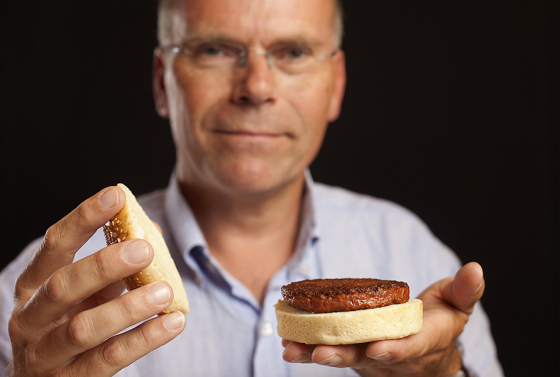Google Co-Founder Sergey Brin financed what could be the next revolution in food production: a test tube-grown hamburger. Dutch researchers unveiled a stem cell-grown 5-ounce beef patty at a public taste testing on Monday. The space-age burger has the potential to offset the extreme environmental damage caused by livestock and supply vital nutrients to the world’s hungry.
The $325,000 patty was produced from cow stem cells and cultured over the weekend, but lead researcher, Professor Mark Post of Mark Post of Maastricht University, estimated that it would be “10 to 20 years” before we could all be eating a McLab burger.
A 2011 Oxford University study finds that synthetic meat could require a mere 1% of the land and 4% of the water of current livestock methods, and use less than half the energy. Since the materials are extracted from the shoulder of a cow, there are limits to how much can be grown without a steady supply of livestock, which has the UK Vegetarian Society “officially interested”–but not officially excited–about the prospects of Brin’s project.
This is all very exciting for environmentalists, animal rights activists, and human rights fans. Yet, the maddening media reaction to this potentially revolutionary product was that the burger could be a tad tastier. “First reaction: Lab-made burger lacks flavor,” ran USA Today‘s headline. Or The Telegraph‘s “£220,000 lab-grown burger is eaten for first time – but needed ketchup.”

Yes, it’s true that the two the taste testers thought the burger could be a bit more delicious. “I was expecting the texture to be more soft,” said volunteer taster Hanni Rutzler. Post acknowledges that synthetic fat is a technical barrier he hasn’t yet overcome.
The point is that this has the potential to impact millions of lives and help avert environmental disaster, not to put out a headline that implies, ‘Nice try, Science.’ Obviously, it’s a work in progress.
By 2050, the Food and Agricultural Organization predicts that meat consumption will double, as growing wealth and population in developing countries overtake our ability to produce enough meat. Perhaps even worse, cattle take up a staggering 70% of agricultural land.
Interestingly enough, Brin is not the first Internet pioneer to fund a meat alternative. Twitter Co-founder Biz Stone has funded a commercially available soy-based faux-chicken product, Beyond Meat. We sampled Beyond Meat at last year’s San Francisco Disrupt Conference, and as an avid Paleo dieter, I can honestly say it was pretty good.
I’m not sure why Internet founders have a thing for alternative meat production, but I suppose there are worse hobbies.
Brin, who appeared by video during today’s test tube burger unveiling, said, “We’re trying to create the first cultured beef hamburger. From there I’m optimistic we can really scale by leaps and bounds.”
[Image: AFP PHOTO / PRESS ASSOCIATION/DAVID PARRY]
